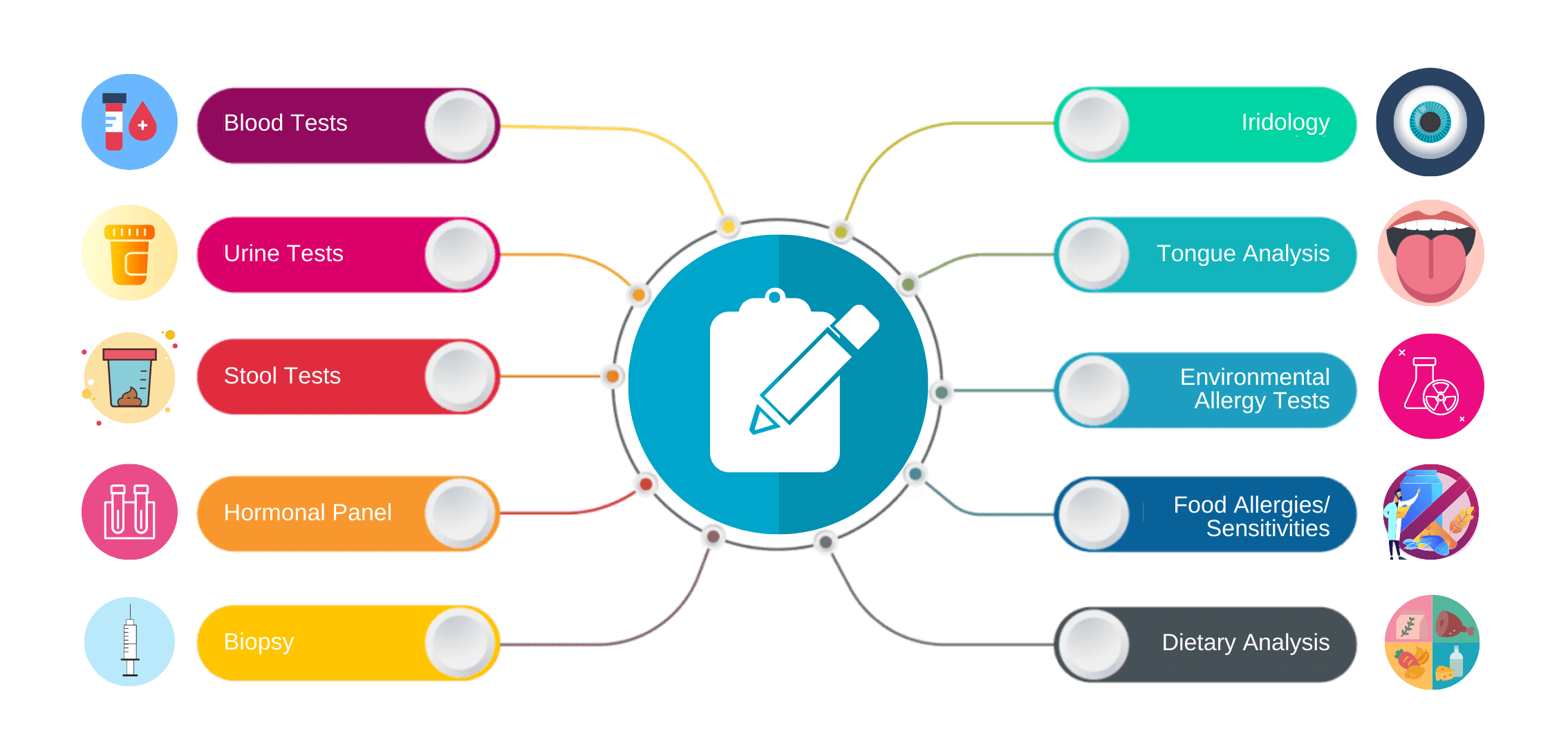What is diagnostic
testing?
Diagnostic testing describes various procedures, both invasive and non-invasive that are performed to screen for, detect and monitor health and disease. Diagnostic testing is used to gather clinical information necessary for confirming a diagnosis.
Naturopath diagnostic testing helps us to fully comprehend and interpret your health concerns. Here at All Naturopath, diagnostic testing often confirms what we believe to be the underlying cause of your symptoms. We spend a lot of time gathering information by questioning you about your diet, lifestyle, exercise and sleep in order to understand how each of these factors impacts your health. When we do need more information we are able to refer you to a local collection lab for thorough diagnostic testing.
The aim of naturopathic diagnostic testing is to reveal imbalances and deficiencies and in treating these factors, bringing the system back into balance. It's holistically treating the root cause of your symptoms, rather than simply reducing the occurrence of symptoms. Naturopath diagnostic testing offers us insight into what is really going on in your body which enables us to create the correct and highly individualised treatment plan.
Can naturopaths do blood tests?
Blood is a key factor in the overall analysis on your health. Blood is the fluid that transports oxygen and nutrients around the body and is made up of red blood cells (oxygenators), white blood cells (defenders), platelets (repairers) and plasma (liquid carrier).
Blood also facilitates communication between our organs, tissues and hormones and because of these important roles, blood tests are a primary diagnostic tool for healthcare practitioners.
The question of whether a naturopath can do blood tests in Australia is very clear - naturopaths do not physically perform blood tests. However, they are able to refer patients directly to a local laboratory or request their GP refer them for bulk billing under Medicare.
What tests do naturopaths do?
-
Full Blood Count
Routinely ordered because it provides an overall picture of health. It is also used to help diagnose a range of specific health problems and to monitor treatments when they are known to affect blood cells.
-
Liver Function Tests
May be ordered to investigate the overall health and function of the liver. The test measures enzymes, proteins, and substances produced or excreted by the liver.
-
Iron Studies
Iron is essential to normal red blood cell function. When your iron levels are low you may experience fatigue and a lack of energy. Low iron levels and stores may indicate an inadequate diet.
-
Thyroid Function Test
Our thyroid gland secretes hormones that regulate many metabolic processes, including growth and energy expenditure. Tests may be ordered if you have signs of an underactive or overactive thyroid.
-
Coeliac Profile
One of several blood tests ordered to assess for coeliac disease. People with coeliac disease often make antibodies that attack tissue transglutaminase (an enzyme that repairs damage in the body). These tests measure tissue those transglutaminase antibodies and could indicate the presence of coeliac disease.
-
Lipids Profile
A basic measure of the amount of “good” and “bad” cholesterol and the level of triglycerides in your blood.
A food allergy causes your body to mount an immune response. There are two types of allergies:
- IgE allergies, which are detected on skin prick (SPT) and blood (RAST tests)
- Cell-mediated (non-IgE) allergies evade standard tests, trigger delayed symptoms, and often persist chronically.
The overreaction of your body’s immune system to a protein from an IgE allergen can vary from mild to severe (anaphylaxis). It typically will occur within minutes of ingesting the allergen.
In Australia, the most common IgE allergens are seafood and tree nuts in adults and egg, cow’s milk and peanut in children.
In contrast, a food intolerance involves a chemical reaction in the digestive system without an immune response.
The intolerance is usually dose dependant, meaning trace or tiny amounts of the problem foods are unlikely to set off symptoms, your body will only react when there is a build-up and your personal threshold is reached.
Symptoms begin to resolve when the offending chemicals are broken down and excreted from the body. Symptoms will not subside however if the offending food(s) continue to be eaten.
Symptoms of food intolerance may include (but are not limited to) bloating, diarrhoea, constipation, flatulence, burping, nausea, irritable bowel syndrome, reflux, indigestion, abdominal pain, migraine, headaches, asthma, exhaustion, skin problems, congestion, hay fever, behavioural problems in children, irritability, depression, memory loss, and weight gain.
Food intolerance does not show up on allergy tests.
Can a naturopath do allergy testing?
Due to the anaphylactic risk of food allergies in some individuals, regulation in Australia under the Australian Register of Naturopaths and Herbalists (ARONH) requires allergies to be treated by a medical doctor.
Do naturopaths do allergy testing? All Naturopath can order IgE blood tests (RAST tests) or skin prick tests (SPT) and have conducted through one of our local pathology labs. However, oral food challenges must be done under medical supervision due to the potential seriousness of the reactions. This is very important for patients with life threatening or severe reactions.
It can happen that sometimes patient history and IgE tests do not match, in which case a doctor may consider provocation challenge test under trained supervision with gradual increasing amounts of the suspected allergen. This is particularly useful to rule out false-positive results, which can be a barrier in allergy diagnosis and management.
Food sensitivities
Food sensitivities and intolerances are not mediated by the immune system and are not life-threatening, instead they are caused by an inability to process or digest a food.
Food sensitivities and intolerances may occur because:
- you don't have the right enzyme to digest a food properly. Lactose intolerance is an example of an enzyme deficiency, which occurs when people are born with, or develop, insufficient lactase enzymes to digest lactose in cow’s milk and other dairy products.
- you react to food additives or preservatives like sulphites, MSG, or artificial colours
- pharmacological factors, like sensitivity to caffeine or other chemicals, and
- sensitivity to the sugars naturally found in certain foods.
How do naturopaths test for food sensitivities?
How do naturopaths test for food insensitivities? The only reliable way for any healthcare practitioner to test for food insensitivities is to conduct a temporary elimination diet.
If removing the food from the diet helps, this is followed by challenges under controlled conditions to identify food triggers which may need to be avoided in the future.
It is essential that elimination diets are temporary and conducted under strict medical supervision, and used only as a diagnostic tool, not a treatment. Prolonged elimination and restricted diets can lead to problems with adequate nutrition, particularly in children.
- Diagnostic Testing
- Naturopathy Consultation
- Nutritional Medicine Consultation
- Herbal Medicine Therapy
- Dietary Analysis
- Iridology Consultation and Report


